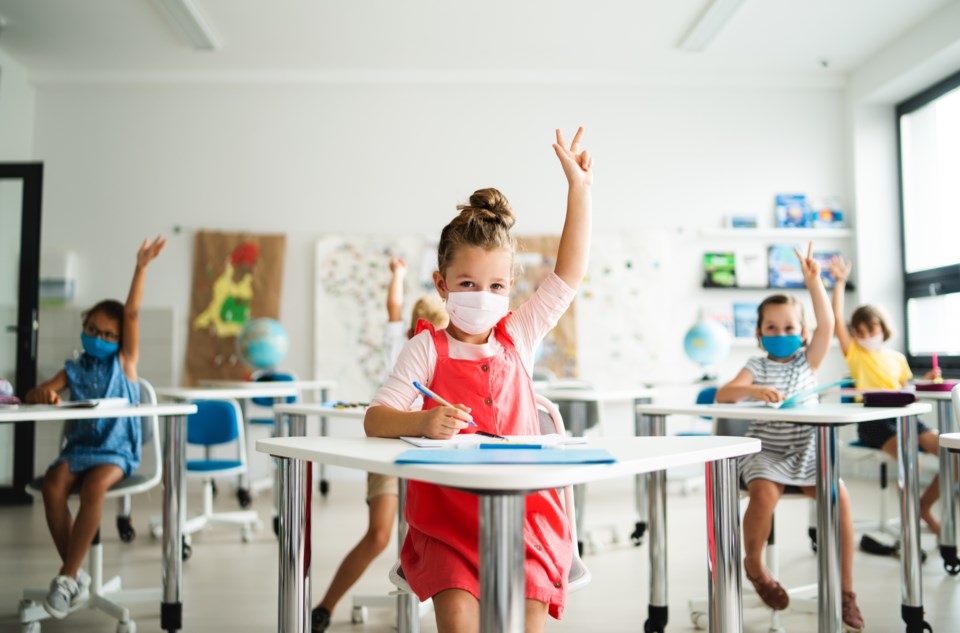Some parents at Pemberton’s École la Vallée are concerned for their children’s safety due to the significant anti-mask population at the school.
According to parent Kristi Thomas, the school’s principal shared statistics on mask wearing in the region at a recent parent meeting—there are 13 students, out of 76 total, who continuously show up to school without a mask on, making up 17 per cent of the total student population at École la Vallée. At Myrtle Philip Community School in Whistler, about five out of 338 students do not wear masks (approximately one per cent), while at Signal Hill Elementary School in Pemberton there are about eight unmasked students out of 400 (two per cent).
“In October when [B.C.’s public health officer Dr.] Bonnie Henry announced the additional requirement and [mask] mandate from Kindergarten through Grade [12], this is when we had additional anarchy, if you will, and parents decided they were not going to send their kids to school with masks,” said Thomas. “I can’t even believe this is a conversation.”
A letter, signed by 16 parents of students at the school who do not support wearing a mask, was sent to the school’s principal, David Brasseau, on Aug. 16 and was shared with Pique on Oct. 23. It outlined what the signatories believe to be medical reasons why wearing masks at a school is detrimental to the wellbeing of children. The parent believed to be the main author declined to be interviewed by Pique.
“We unequivocally demand that our children not be subjugated to the harmful restrictions of mandatory masking,” said the letter. “There are many scientific studies which point to the fact that masking children is both unhealthy (physically and mentally) and unnecessary.”
The letter continues, “By forcing children to wear a mask, they are learning that their needs and desires are not important and instead that they must conform—regardless of their personal wellbeing—to what is asked of them by authorities. Basic human interaction free of mask and onerous restrictions around contact is a fundamental human right and human need.”
However, according to developmental psychologist at the University of British Columbia Andrew Baron, there is no academic research out there that has shown any detrimental effects of masking on a child’s social or cognitive development.
“We have children clean their room and put away their clothes even though many protest this. We limit how much screen time a child can have even though many would choose to never have limits. We have children eat their vegetables even though many do not want to,” said Baron.
“It’s absurd, naive and wrong to think that requiring masks to be worn somehow adversely affects a child’s sense of self-efficacy. Or does so any more than the everyday examples above.”
In fact, Baron believes the message to kids is one of empathy.
“It’s noteworthy that one can also look at the same situation and think we are fostering a greater sense of collective identity—encouraging pro-sociality and fostering a stronger sense of helping others, since mask wearing specifically helps others,” he said. “In fact, this kind of pro-sociality is often quite difficult to teach children and so, if anything, this can be seen as an opportunity to teach some very valuable lessons about being community-minded and caring for others, particularly others that extend beyond one’s immediate family.”
Conseil scolaire francophone de la Colombie-Britannique (CSF), also known as School District 93, which covers all of the province’s French schools, currently follows the communicable disease guidelines outlined by the government that requires all students and staff from Kindergarten to Grade 12 to wear a mask when receiving services indoors with no barrier present.
However, in those guidelines, it is written that, “Schools must not require a health-care provider note (i.e. a doctor’s note) to confirm if staff, students or visitors cannot wear a mask,” meaning a note from a parent is all that is needed for students not to wear a mask. The guidelines also state that “no student should be prevented from attending or fully participating at school if they do not wear a mask,” leaving schools effectively unable to enforce the mandate and creating a frustrating contradiction for parents like Thomas.
“Not even a doctor’s note, just the parents saying it. It’s ridiculous,” said Thomas. “If your child has a psychosocial disorder or they are physically harmed by wearing a mask, then go have them evaluated by a licenced psychiatrist, get a physician’s note and then sure, there you go. ”
However, Thomas still hopes that the parents will “step up” and recognize that there is a pandemic and adhere to the mask requirements while at school. But if that doesn’t happen, she hopes that the CSF can find a solution to this issue.
“We have parents that don’t want to send their kids to school, and we have other parents who think they can just send their kids to school without masks. What’s the solution?” said Thomas.
When asked about possible solutions, CSF’s head of public affairs Pascale Cyr said the school division follows the guidelines set out by the government and any further questions should be directed to the Ministry of Education.
A spokesperson for the Ministry of Education responded by saying, “School districts and individual schools have the responsibility to address mask exceptions for students. School staff will work with parents and families if a child is unable to wear a mask at school.”
According to the ministry, exceptions to the mask policy include people who cannot tolerate wearing a mask for health or behavioural reasons, a person who is unable to put on a mask without assistance, temporarily removing the mask to identify someone, if a person is eating or drinking, if a person is behind a barrier, and while providing a service to a person with a disability where facial expressions or lip reading are important.




